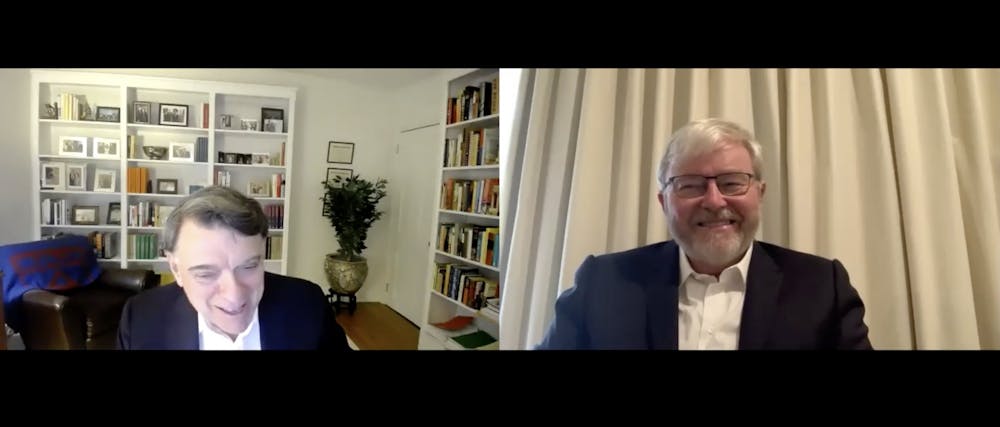The Wharton Undergraduate Finance and Technology Group hosted former Australian Prime Minister Kevin Rudd in a virtual event last week, where he discussed how United States-China relations may affect the international political arena after COVID-19.
The event, which took place on March 9, was hosted to encourage business students to see the global implications of industry trends, according to Wharton and College sophomore and WUFT co-president Daniel Tan.
After a brief introduction by Wharton Dean Erika James, the conversation between Rudd and Joshua J. Harris Marketing Professor Thomas Robertson began with a discussion on the emerging and potentially anarchic system of the international community that Rudd previously explored in an article he wrote last year titled "The Coming Post-COVID Anarchy."
The anarchy, Rudd mentioned, is rooted in America’s recent withdrawal from the open political and economic system that other countries were accustomed to over the previous 70 years.
Rudd then explained that the post-WWII global rules have been anchored in American military and economic power, which he said is why former President Donald Trump’s protectionism, exit from the World Trade Organization and the United Nations Human Rights Council, and withdrawal from funding the UN institutions left America's friends and allies around the world in shock.
Although Rudd highlighted that it is too early to form judgments regarding the Biden administration, he believes the new administration's initial actions such as the passage of a $1.9 trillion COVID-19 relief package and reconsolidation of relationships with key allies are positive steps compared to “the wreckage” of the last four years.
“Objectively, it's a highly technically competent and qualified team. They know what they are doing,” Rudd said of the Biden administration. “The problem when the Trumpists arrived was that they did not know what they were doing. And these were often the folks who've never been near administration in their lives before.”
According to Rudd, today’s “loud and proud” China, which aggressively asserts its national interests and values, is very different from former Chinese communist leader Deng Xiaoping’s China and presents a new reality for the world.
RELATED:
Stacey Abrams discusses founding Fair Fight, Southern progressivism at Annenberg event
Penn Law event breaks down causes behind recent rise in anti-Asian discrimination
“I've spent a lot of my life on U.S.-China relations, even though I'm neither Chinese nor American, mainly because your two countries have the opportunity to roll out a brilliant future for the world of the 21st century, or produce an unreconstructed disaster,” Rudd said.
He added that China has been struck by America's technological breakthroughs and now strives to become a technologically self-sufficient country with high levels of innovation and commercialization.
To manage the complex relationship between the United States and China, Rudd advocated for a strategic competition on several technological and economic issues, such as the future of semiconductors or capital markets.
He added that strategic cooperation between the nations would help address issues like climate change and the global debt market.
Discussing climate change, Rudd praised the scientific values of the 2015 Paris Agreement, which the United States joined this January under the new Biden administration. He stressed the importance of the United Nation’s guidelines of achieving carbon neutrality by 2050 and having carbon peak for the developed economies in the current decade in order to avoid irreversible damage to global ecosystems and massive adaptation impacts on the human race.
During the event, Rudd also reflected on his experience in 2008 delivering a formal apology from the Australian government to the nation's Indigenous people, which he made in response to laws and policies that had "inflicted profound grief, suffering, and loss" on the Indigenous Australians. He stressed how important it was to follow this symbolic act with a national strategy full of mathematics and funding to close education, health, and employment gaps.
Rudd said that such an approach allowed Australia to see improvements in decreasing these gaps. He advised Americans to create a national legislative act of reconciliation towards Native Americans, Black people, Latinx communities, and Asian Americans, and then succeed it with a range of programs to close gaps between these communities.
Wharton sophomores Jake Iyoob and Shiva Menta, who attended the event, said they found it engaging to hear from a perspective outside of the United States about actionable steps the country can take regarding racial reconciliation and climate change.
Wharton first year and WUFT co-vice president of education Brian Lee said that, although Rudd talked about some of the most important issues in the world right now, he thought the focus of the conversation was broader.
“The reason that he entered politics and engages students like us in these events is because he genuinely believes that if we think about what we are passionate about and good at, and then work on these problems, and not just as, ‘Oh, I'm going to get a job and do this and that’ — which a pre-professional culture often breeds — but as, ‘Why is this problem prominent in the world, and what can I tangibly do to fix it?” Lee said. “If you scale that mindset across young people, then you see that endogeneity of history, and you can make an impact.”









